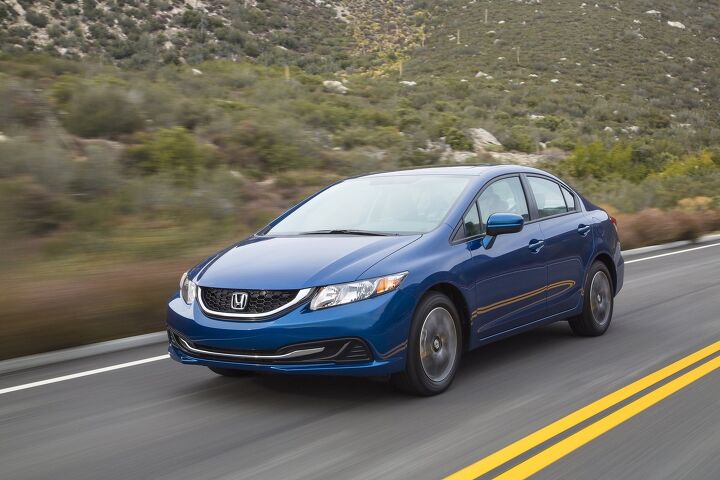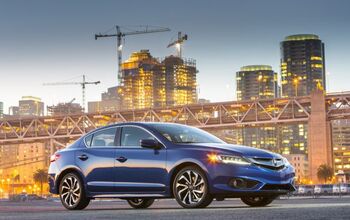Honda Civic Sales Are Steadily Declining; Corolla's Rising
American Honda’s Civic posted decreased sales volume in each of the last five months. After claiming the title of America’s best-selling small car in two consecutive years, it’s highly unlikely that the Civic will be able to catch the Toyota Corolla with just one month of sales reporting remaining in calendar year 2014.
U.S. Civic sales through the first six months of 2014 increased 5% compared with the same period one year earlier. While the Civic trailed the Corolla at the halfway point in 2014, that second-place status was actually in keeping with the results from 2013, a year in which Honda’s compact sedan and coupe ended 34,000 sales ahead of the venerable Toyota compact. (Note: Corolla sales reported by Toyota USA always include the Matrix.)
But from July 2014 onward, the Civic did not prove capable of matching 2013’s impressive second-half sales rate, a period which saw Honda generate 53% of its 2013 Civic volume, sufficient for Honda to post the highest level of Civic sales since 2008.
July volume in 2014 slid 7% before August’s 14% plunge, September’s 3% dip, and 12% declines in both October and November. In the July-November period of 2013, Honda sold 148,476 Civics in the United States, but that figure dropped by nearly 15,000 units to 133,547 in 2014.
We can’t deny the impact of outside forces. The traditional top-selling car in America, the Corolla, was redesigned more recently than the Civic. ( Corolla volume has increased in seven of the last eight months.) Manufacturers are always working to strike the right balance between chasing volume (with incentives, for example) and protecting long-term profits (by linking OTD prices more closely with MSRPs.) Honda is also well-known for generating the lion’s share of its volume from retail customers.
Yet any dismay over the Civic’s recent decline can cause us to forget the fact that it’s still a wildly popular car, just not as popular as it was a year ago. Through the end of November, Honda topped the 300,000-unit barrier for the third consecutive year and for the seventh time in the last decade. It’s America’s second-best-selling small car by a wide margin, leading the Chevrolet Cruze by more than 45,000 units.
Meanwhile, north of the border, the Civic has secured a 17th consecutive victory as Canada’s best-selling car overall and will report in 2014 the nameplate’s best year since 2008. Back in the U.S., Honda’s good news is plentiful, though it’s not necessarily Civic-related. The CR-V outsold all utility vehicles and all cars in November 2014. The Accord, up 7% through the first eleven months of 2014, was America’s best-selling car in August and September.
Timothy Cain is the founder of GoodCarBadCar.net, which obsesses over the free and frequent publication of U.S. and Canadian auto sales figures.
More by Timothy Cain
Latest Car Reviews
Read moreLatest Product Reviews
Read moreRecent Comments
- Fred I would get the Acura RDX, to replace my Honda HR-V. Both it and the CRV seats are uncomfortable on longer trips.
- RHD Now that the negative Nellies have chimed in...A reasonably priced electric car would be a huge hit. There has to be an easy way to plug it in at home, in addition to the obvious relatively trickle charge via an extension cord. Price it under 30K, preferably under 25K, with a 200 mile range and you have a hit on your hands. This would be perfect for a teenager going to high school or a medium-range commuter. Imagine something like a Kia Soul, Ford Ranger, Honda CR-V, Chevy Malibu or even a Civic that costs a small fraction to fuel up compared to gasoline. Imagine not having to pay your wife's Chevron card bill every month (then try to get her off of Starbuck's and mani-pedi habits). One car is not the solution to every case imaginable. But would it be a market success? Abso-friggin-lutely. And TTAC missed today's announcement of the new Mini Aceman, which, unfortunately, will be sold only in China. It's an EV, so it's relevant to this particular article/question.
- Ajla It would. Although if future EVs prove relatively indifferent to prior owner habits that makes me more likely to go used.
- 28-Cars-Later One of the biggest reasons not to purchase an EV that I hear is...that they just all around suck for almost every use case imaginable.
- Theflyersfan A cheaper EV is likely to have a smaller battery (think Mazda MX-30 and Mitsubishi iMEV), so that makes it less useful for some buyers. Personally, my charging can only take place at work or at a four-charger station at the end of my street in a public lot, so that's a crapshoot. If a cheaper EV was able to capture what it seems like a lot of buyers want - sub-40K, 300+ mile range, up to 80% charging in 20-30 minutes (tops) - then they can possibly be added to some lists. But then the issues of depreciation and resale value come into play if someone wants to keep the car for a while. But since this question is asking person by person, if I had room for a second car to be garaged (off of the street), I would consider an EV for a second car and keep my current one as a weekend toy. But I can't do a 50K+ EV as a primary car with my uncertain charging infrastructure by me, road trips, and as a second car, the higher insurance rates and county taxes. Not yet at least. A plug in hybrid however is perfect.



































Comments
Join the conversation
I used to get excited about new Honda products (think later 90a-early 00s). New, exiting engines, great suspensions, overall "fun" cars. Fast forward to 2014... Honda now makes bloated and overweight Civic with an extremely underpowered D-Series motor that dates back further than my memory! Need an extra side of jagged edged plastic? No need, I wonder if there is any metal on a modern Honda? The only reason this works for Toyota is due to a superior product and exceptional customer service (like when they replaced the frame on my 13 year old Tundra). In contrast. Honda turned me away despite legitimate warranty claims on different vehicles. The Honda name has been milked for all its worth and buyers are starting to realize. This is why I now drive a Fiesta ST! My grandparents traded in their Civic for an Altura and my mother will be giving her Accord back after yet another transmission failure. Honda is a completely different product than it was in he 90s. Hopefully they figure it out before they replace Chrysler in the rental car market!
I'm sure the Civic sales are slipping because the Civics got ugly! Is the worst looking civic in over 20 years.